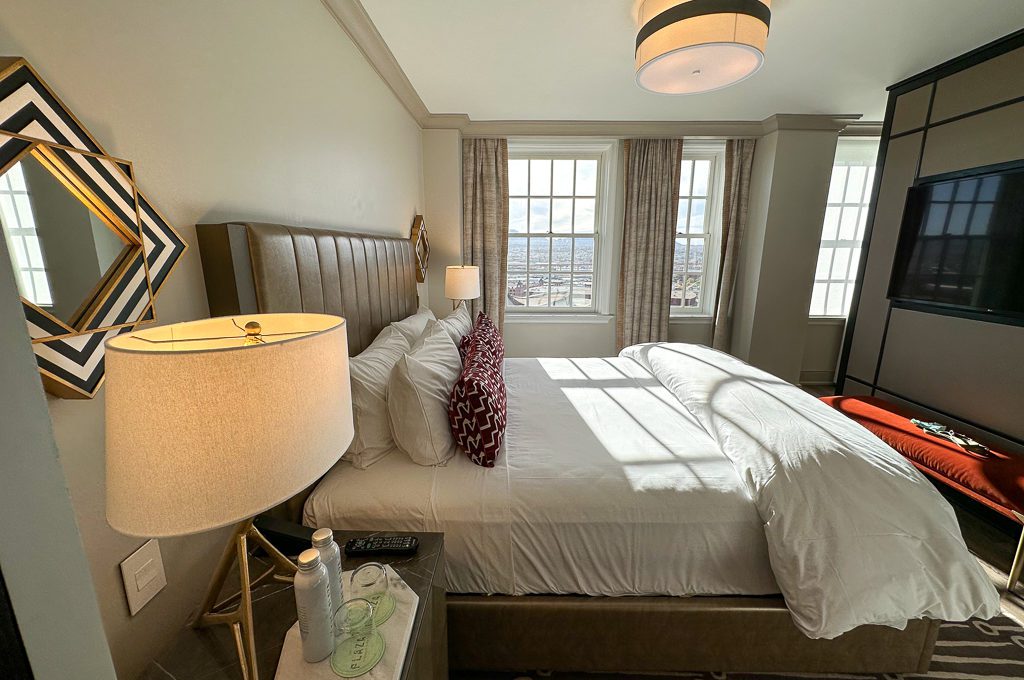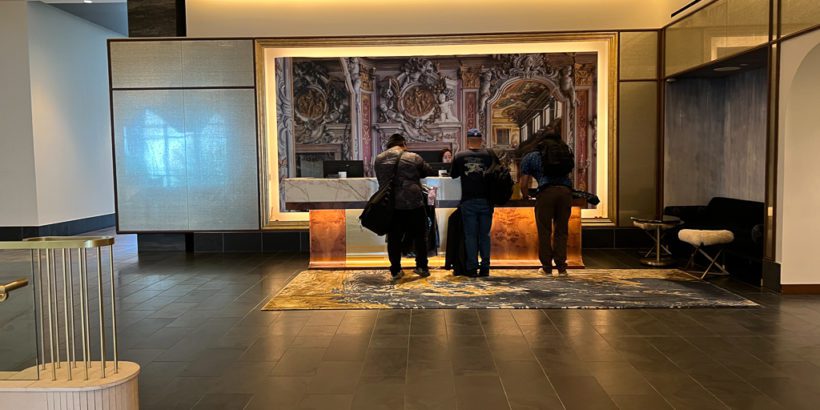Have you ever wondered if a hotel could ever legally refuse service to a guest?
Perhaps you are curious about potential discrimination or just wondering what the law says about hotels denying service.
In this article, we will take a deep dive and look at whether or not a hotel can refuse service to a guest.
I’ll provide you with specific examples that show when it may be both inappropriate and appropriate so that you have a good understanding of what is allowed.
Table of Contents
Can a hotel refuse a guest?
Hotels and other businesses that provide lodging can refuse guests but they must be careful that they are not discriminating based on a protected class. For that reason, a hotel would likely only deny service based on a valid reason recognized by the law, such as if a guest was engaged in criminal activity or refusing to pay.
Tip: Use the free app WalletFlo to help you travel the world for free by finding the best travel credit cards and promotions!
Public accommodation laws
Hotels have to be very careful with declining service to guests because hotels are subject to public accommodation laws.
Public accommodation laws were designed to prevent discrimination in places of public accommodation, which include places like restaurants, stores, theaters, stadiums, etc. Hotels are also one of the most widely recognized forms of public accommodation.
In fact, Title II of the Civil Rights Act of 1964 kicks off its list of public accommodations with “any inn, hotel, motel, or other establishment which provides lodging to transient guests.”
According to federal law, a hotel will not be able to discriminate on the basis of race, color, religion, or national origin. The Americans with Disabilities Act of 1990 adds public accommodation protection to those with disabilities as well.
But there are also state laws that apply to public accommodations. Often times, these state laws include more protected classes. For example, the state of California prevents discrimination on the basis of the following:
- sex
- race
- color
- religion
- ancestry
- national origin
- disability
- medical condition
- genetic information
- marital status
- sexual orientation
- citizenship
- primary language
- immigration status
They also make it clear that there could be other protected classes so denying someone service based on a personal characteristic is always a bad idea for a hotel.
And finally, cities also often have ordinances that have protected classes.
All of these different laws protecting people from discrimination are why those signs that say “we reserve the right to refuse service to any customer” don’t actually mean a business could turn away anybody for any reason.
They still have to take the law into consideration.

When hotels can deny a guest service
In general, a hotel can legally deny a guest service so long as they are not basing the decision on a protected personal characteristic.
Remember, such a characteristic could be protected on the federal, state, or local level (or all three).
While there may be many protected classes, those laws still leave open a lot of possibilities for hotels to deny lodging to someone.
But it’s not a good idea for hotels to deny service to any customer unless they have a very specific reason for doing so.
That’s because they could open the door to getting sued for discriminating against a protected class or just develop a really bad reputation for arbitrarily denying service to guests.
While denying service to someone should always be a big decision, denying lodging to someone can be particularly disastrous. That’s because depending on what other lodging options are available, a hotel could be essentially leaving someone without shelter for the night.
So typically a hotel would want to have a very specific (and objectively reasonable) justification for turning away a guest. Often this will be because the hotel wants to protect the health or safety of their guests and staff or for other well-recognized reasons.
Some states actually provide specific scenarios for when a guest could be denied service at a hotel.
These provide clarity to hotel owners so that they know they can avoid a lawsuit or criminal charges if they deny accommodations based on one of the published reasons.
Taking a look at those can help us understand the different scenarios where someone might be denied service and I’ve broken down some of those below.
Refusal to pay
It’s no surprise that a hotel can turn you away for not paying.
How would this actually play out?
If you were paying cash for your stay then it would be a simple matter of you not being able to supply the necessary cash to secure or pay for your booking.
But in the much more likely event you are paying with a credit card, it would probably come down to your card not being able to cover the deposit.
If someone under 21 or 18 is trying to check in, the hotel will probably require a responsible parent or adult to provide payment along with signing a form to show responsibility for any liability.
Drunk or disorderly conduct
Another common reason why someone might be denied service is if they show up to the hotel clearly intoxicated and/or causing a nuisance.
A little bit buzzed is probably okay but visibly intoxicated is a different story.
Intoxicated people tend to be prone to things like damaging property, violence, and just making people uncomfortable so this is clearly a valid reason to prevent people from coming in.
Sometimes use of profanity or lewd conduct falls under this disorderly conduct category as well. Basically, if you’re disturbing the peace of other guests you could be denied service.
Using the room to commit a crime
If the hotel reasonably believes that someone is going to use one of their hotel rooms for an unlawful purpose, that can be sufficient justification for declining service.
For example, someone could be planning on using a hotel room to sell drugs or run an illegal prostitution ring.
Another common situation could be kids under the age of 21 trying to use a hotel room to party it up and drink alcohol, smoke weed, etc.
Denying service on the basis of a hunch that someone will do something illegal can obviously be a risky endeavor because you could run the risk of being accused of discrimination of some sort if you get it wrong.
Hotel believes the guest is bringing in something that creates danger
If a hotel reasonably believes that a guest is bringing something into the room that creates a danger to other guests or the public, that could be a reason to decline service.
A classic example of this would be bringing a firearm into a hotel where they are not permitted. A more extreme example mentioned in some statutes would be someone bringing in some type of explosive or biological hazard.
Going above capacity
Hotels place restrictions on the number of people allowed in each room because they have to abide by the fire code.
Basically, fire codes limit the amount of people in each room so that in the event of an emergency, people can easily make it to the exits and the stairs.
If someone is actively bringing in more guests into the room than what they are allowed to bring, they could be creating a real safety hazard for other guests in the hotel. For that reason, a hotel could refuse to provide them service.
Refusal to abide by policies
If a guest refuses to abide by reasonable policies that are conspicuously posted or published that could be a reason to turn them away.
These policies need to be related to the operation in management of the hotel. So a hotel would not have success by saying that someone could not enter if they are wearing a Selena Gomez shirt, for example.
These type of policies became controversial during the coronavirus pandemic when hotels had policies requiring masks to be worn.
Kicked out guests
If the guest was already kicked out and now is attempting to book a new room at the hotel, the hotel likely has full authority to deny them lodging.
Final word
A hotel can deny service to customers but they have to be very careful they are not discriminating on the basis of a protected class. For that reason, states often publish laws that specify certain instances where a hotel can deny lodging without having to worry about breaking the law. Typically, these would be situations where people are being disorderly, engaged in criminal acts, or failing to pay.
Daniel Gillaspia is the Founder of UponArriving.com and the credit card app, WalletFlo. He is a former attorney turned travel expert covering destinations along with TSA, airline, and hotel policies. Since 2014, his content has been featured in publications such as National Geographic, Smithsonian Magazine, and CNBC. Read my bio.


Thank you for your article. My wife and I were just denied service while trying to check into a Best Western that I had made a reservation at weeks before because we are considered “local”. I called the Best Western customer service line and was informed that “lots of hotels have individual policies that Best Western itself has no control over”. Obviously being refused service because a policy considers me to be a “local” (I live in a neighboring town) seems bad business at best and discriminatory at worst. I don’t see any protected class above that applies to regionality or where someone lives – but it does seem either outright illegal or bordering on the illegal no matter how I try to look at it. Thoughts?
Yeah, I saw a couple of these instances when doing my research.
I’m definitely not a fan of hotels doing this especially because I take “staycations” all the time.
Unfortunately, it does seem like it’s legal and some localities even have rules stating that it is okay to turn away locals.
I had a Hotel who has the same owners as the hotel that I was working for… literally right across the street from my hotel ..I’m no longer working at the hotel now. However, I have been getting rooms at the hotel across the street from the one I was working at .. I recently just had a room there last week for two nights …come this week I tried to get a room and the manager stated that they were no longer allowing me service yet the first thing she stated also was that she was aware I was no longer working at the hotel across the street.
So it’s made me feel like it was personal because when I asked her the reason why t she was denying my service she stated it was due to a bad review that I never gave! Could a Hotel deny service? I also asked if she could send me the proof of the review with the date and time ..she stated that she would be able to do this sometime next week. How many days should I give her?